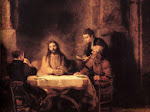Specifically, Tolkien began writing The Hobbit in the early 1930s when he suddenly felt inspired to write on a blank piece of paper, "In a hole in the ground there lived a hobbit." However, the fictional hobbit had an entire mythological universe to live within because of the stories Tolkien had already been writing for years. Tolkien completed writing it in 1932, but only distributed it to friends, so it took until 1937 for a friend to get a copy to a publisher, who published it to great critical and public acclaim.
In addition, as I wrote about in a previous post, Tolkien met C. S. Lewis in 1926, and they embarked on a mission to revive fairy tales as a serious literary device. The Hobbit represented the first effort along these lines essentially as a children's fairy tale.
 Tolkien, an excellent scholar of English philology (the study of language), especially of Germanic and Nordic origins, borrowed from much Germanic and Nordic mythology in constructing his mythology reflected in The Silmarillon and The Hobbit. So, for example, the hero, Bilbo Baggins, eventually confronts a dragon, Beowulf scholarly, much as the hero Beowulf does in the old epic English poem. (Tolkien was a well-known Beowulf scholar.) However, while the Beowulf hero portrays a large, muscular, and powerful superhero, subject to moral flaws, who seeks glory in conquest, Bilbo Baggins portrays a small weak figure, though courageous, who prefers his comfortable home to adventure, prefers harmony to riches, and who takes up adventure to help others, rather than for self promotion, though he grows as a character by undertaking adventure. Thus while Tolkien borrows from Germanic and Nordic myths, he infuses them with a different morality and ethical basis informed by his Catholic upbringing, which reanimates them. (In fact, Tolkien gave a groundbreaking lecture on Beowulf around 1936 which changed the whole view on this.)
Tolkien, an excellent scholar of English philology (the study of language), especially of Germanic and Nordic origins, borrowed from much Germanic and Nordic mythology in constructing his mythology reflected in The Silmarillon and The Hobbit. So, for example, the hero, Bilbo Baggins, eventually confronts a dragon, Beowulf scholarly, much as the hero Beowulf does in the old epic English poem. (Tolkien was a well-known Beowulf scholar.) However, while the Beowulf hero portrays a large, muscular, and powerful superhero, subject to moral flaws, who seeks glory in conquest, Bilbo Baggins portrays a small weak figure, though courageous, who prefers his comfortable home to adventure, prefers harmony to riches, and who takes up adventure to help others, rather than for self promotion, though he grows as a character by undertaking adventure. Thus while Tolkien borrows from Germanic and Nordic myths, he infuses them with a different morality and ethical basis informed by his Catholic upbringing, which reanimates them. (In fact, Tolkien gave a groundbreaking lecture on Beowulf around 1936 which changed the whole view on this.)I highly recommend reading The Hobbit, which you will enjoy.
You may want to read my post about the film trilogy by Peter Jackson, based upon this book, "The Hobbit (the films)."
The Lewis-Tolkien Friendship




